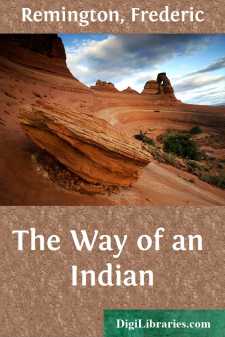Categories
- Antiques & Collectibles 13
- Architecture 36
- Art 48
- Bibles 22
- Biography & Autobiography 813
- Body, Mind & Spirit 142
- Business & Economics 28
- Children's Books 17
- Children's Fiction 14
- Computers 4
- Cooking 94
- Crafts & Hobbies 4
- Drama 346
- Education 46
- Family & Relationships 57
- Fiction 11829
- Games 19
- Gardening 17
- Health & Fitness 34
- History 1377
- House & Home 1
- Humor 147
- Juvenile Fiction 1873
- Juvenile Nonfiction 202
- Language Arts & Disciplines 88
- Law 16
- Literary Collections 686
- Literary Criticism 179
- Mathematics 13
- Medical 41
- Music 40
- Nature 179
- Non-Classifiable 1768
- Performing Arts 7
- Periodicals 1453
- Philosophy 64
- Photography 2
- Poetry 896
- Political Science 203
- Psychology 42
- Reference 154
- Religion 513
- Science 126
- Self-Help 84
- Social Science 81
- Sports & Recreation 34
- Study Aids 3
- Technology & Engineering 59
- Transportation 23
- Travel 463
- True Crime 29
The Way of an Indian
Description:
Excerpt
I. White Otter's Own Shadow
White Otter's heart was bad. He sat alone on the rim-rocks of the bluffs overlooking the sunlit valley. To an unaccustomed eye from below he might have been a part of nature's freaks among the sand rocks. The yellow grass sloped away from his feet mile after mile to the timber, and beyond that to the prismatic mountains. The variegated lodges of the Chis-chis-chash village dotted the plain near the sparse woods of the creek-bottom; pony herds stood quietly waving their tails against the flies or were driven hither and yon by the herdboys—giving variety to the tremendous sweep of the Western landscape.
This was a day of peace—such as comes only to the Indians in contrast to the fierce troubles which nature stores up for the other intervals. The enemy, the pinch of the shivering famine, and the Bad Gods were absent, for none of these things care to show themselves in the white light of a midsummer's day. There was peace with all the world except with him. He was in a fierce dejection over the things which had come to him, or those which had passed him by. He was a boy—a fine-looking, skillfully modeled youth—as beautiful a thing, doubtless, as God ever created in His sense of form; better than his sisters, better than the four-foots, or the fishes, or the birds, and he meant so much more than the inanimate things, in so far as we can see. He had the body given to him and he wanted to keep it, but there were the mysterious demons of the darkness, the wind and the flames; there were the monsters from the shadows, and from under the waters; there were the machinations of his enemies, which he was not proof against alone, and there was yet the strong hand of the Good God, which had not been offered as yet to help him on with the simple things of life; the women, the beasts of the fields, the ponies and the war-bands. He could not even protect his own shadow, which was his other and higher self.
His eyes dropped on the grass in front of his moccasins—tiny dried blades of yellow grass, and underneath them he saw the dark traceries of their shadows. Each had its own little shadow—its soul—its changeable thing—its other life—just as he himself was cut blue-black beside himself on the sandstone. There were millions of these grass-blades, and each one shivered in the wind, maundering to itself in the chorus, which made the prairie sigh, and all for fear of a big brown buffalo wandering by, which would bite them from the earth and destroy them.
White Otter's people had been strong warriors in the Chis-chis-chash; his father's shirt and leggins were black at the seams with the hair of other tribes. He, too, had stolen ponies, but had done no better than that thus far, while he burned to keep the wolf-totem red with honor. Only last night, a few of his boy companions, some even younger than himself, had gone away to the Absaroke for glory and scalps, and ponies and women—a war-party—the one thing to which an Indian pulsed with his last drop....




